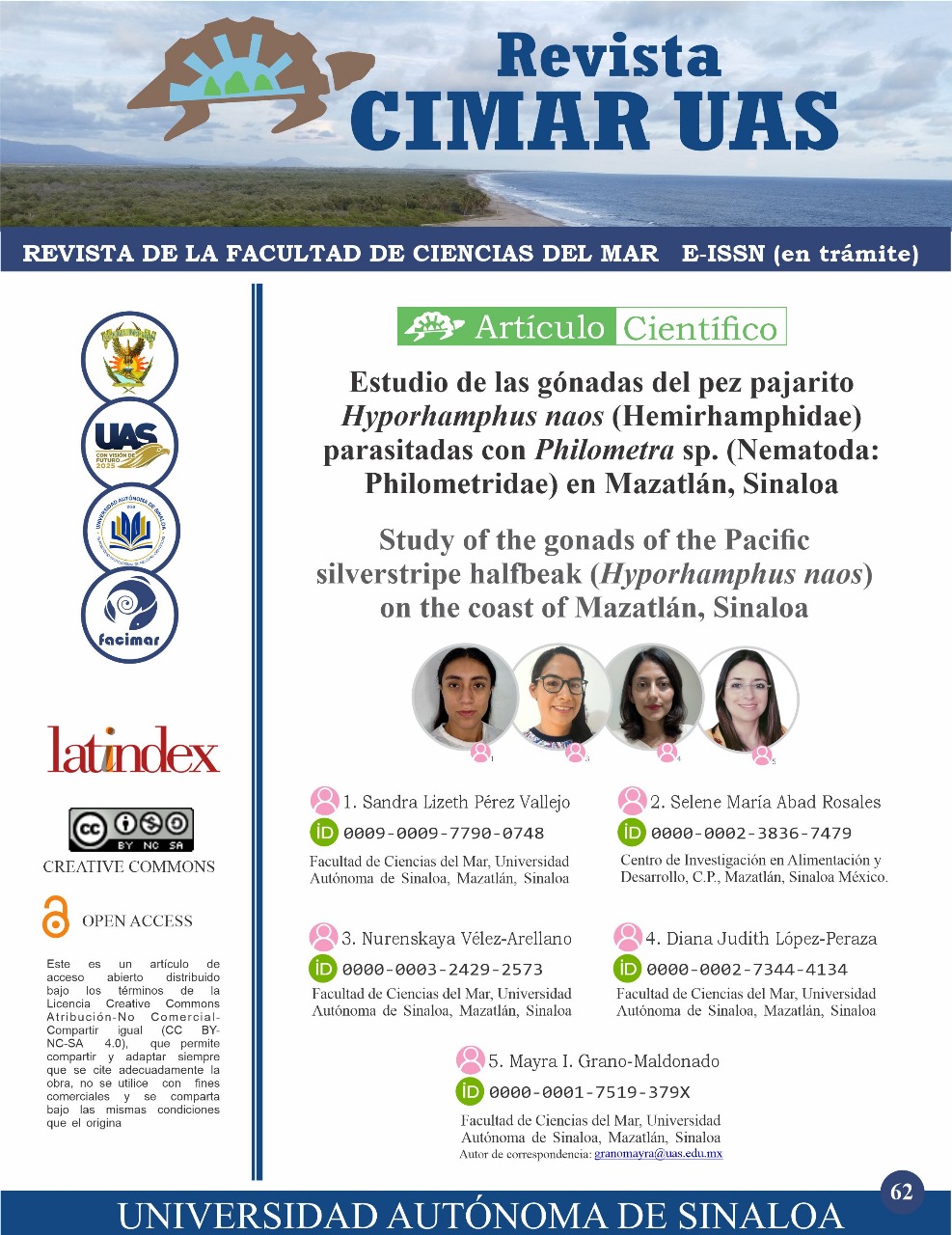Study of the gonada of the Pacific silverstripe halfbeak (Hyporhamphus naos) on the coast of Mazatlán, Sinaloa.
Keywords:
Reproduction, helmint, histology, Tropical Pacific, GonadAbstract
The objective of this study was to report for the first time the presence of the parasite Philometra sp. (Nematoda: Philometridae) in the male gonad of the silverstripe fish Hyphorhamphus naos Banfort and Collete (2001) of the Hemiramphidae family in the Mexican Pacific. The organisms were obtained at the Isla de la Piedra and Playa Norte in Mazatlán, Sinaloa. The fish were taken to the laboratory where the parasitized gonads were removed and a section of gonad tissue was taken from females and males parasitized with this nematode, which was examined with histological techniques. The results showed that the gonads did not present tissue damage, nor any apparent immune response in the gonads in both sexes. However, 26% of eosinophilic cells are present in the ovary tissue. It is suggested that systematic interannual sampling should be carried out at other arrival times of this fish at the Bay of Mazatlán, to evaluate changes in the parasitism of Philometra sp, on the gonads of Hyporhamphus naos.
Downloads
References
Bakenhaster, M. D., Lowerre-Barbieri, S., Kiryu, Y., Walters, S., & Fajer-Avila, E. J. (2014). Philometra floridensis (Nematoda: Philometridae) damages ovarian tissue without reducing host (Sciaenops ocellatus) fecundity. Diseases of Aquatic Organisms, 108(3), 227-239. https://doi.org/10.3354/dao02695
Banford, H. M. y Collette, B. B. (2001). A new species of halfbeak, Hyporhamphus naos (Beloniformes: Hemiramphidae), from the tropical eastern Pacific. Revista de Biología Tropical, 1, 45-46.
Bell, T. A., & Lightner, D. V. (1988). A Handbook of Normal Penaeid Shrimp Histology. Allen Press, Kansas, 114 pp.
Caspeta, J. M., Ramírez, J. G., & Peralta, J. L. (2009). A new philometrid species (Nematoda) from the freshwater fish Cichlasoma istlanum (Jordan and Snyder, 1899) (Cichlidae) in Mexico. Journal of Parasitology, 95(2), 403-406. https://doi.org/10.1645/GE-1768.1
Deepthi, G. R., Sreekala, L. K., Sunil, M. S., Radhakrishnan, T., & Radhakrishnan, S. (2007). Molecular stress response of the long-arm mullet, Valamugil cunnesius (Val.), to Philometra cephalus (Nematoda) infection. Indian Journal of Multidisciplinary Research, 3, 327-334.
García Prieto, L., Osorio Sarabia, D., & Lamothe-Argumedo, M. R. (2014). Biodiversidad de Nematoda parásitos de vertebrados en México. Revista Mexicana de Biodiversidad, 85, 171-176. https://doi.org/10.7550/rmb.31746
Grano Maldonado, M. I., & Mendieta, R. A. (2020). Parasitosis, turismo gastronómico e identidades alimentarias: un problema de salud pública en Mazatlán, Sinaloa, México. Neotropical Helminthology, 13(2), 203-225. https://doi.org/10.24039/rnh2019132641
Grano Maldonado, M. I., & Pérez Ponce de León, G. (2023). Patrones de diversidad de la fauna de metazoarios parásitos de peces marinos en la Bahía de Mazatlán, Sinaloa. Revista Ciencias del Mar UAS, 1(1), 59-85.
Grano Maldonado, M. I., Andrade Gómez, L. Mendoza Garfias, B., Solórzano García, B., García Pantoja, A. Nieves Soto, M. Pérez Ponce de león, G. (2024). Metazoan Parasites of the Pacific Silverstripe Halfbeak, Hyporhamphus naos (Osteichthyes: Hemiramphidae) in Mazatlán Bay, Mexico. Pacific Science, 77(4): 441-45. https://doi.org/10.2984/77.4.6
Innal, D., Stavrescu-Bedivan, M., & Ozmen, O. (2020). Parasite infection in Serranus cabrilla (Perciformes, Serranidae): histopathological aspects and new host record for nematode genus Philometra from Aegean Sea, Turkey. Journal of the Hellenic Veterinary Medical Society, 70(4), 1817–1822. https://doi.org/10.12681/jhvms.22227
Luna, L. (1968). Manual of histologic staining methods of the Armed Forces Institute of Pathology. McGraw-Hill Book Company, New York.
McBride, R., & Thurman, P. E. (2003). Reproductive Biology of Hemiramphus brasiliensis and H. balao (Hemiramphidae): Maturation, Spawning Frequency, and Fecundity. Biological Bulletin, 204(1), 57-67. https://doi.org/10.2307/1543496
Moravec, F. (2006). Dracunculoid and Anguillicoloid Nematodes Parasitic in Vertebrates. Helminthologia, 44(3), 150-150. https://doi.org/10.2478/s11687-007-0023-7
Moravec, F., & Buron, I. (2013). A synthesis of our current knowledge of philometrid nematodes, a group of increasingly important fish parasites. Folia Parasitologica, 60, 81-101.
Moravec, F., Salgado, G., & Aguilar, R. (2002). Two new nematodes, Paraseuratoides ophisterni gen. et sp. n. (Quimperiidae) and Philometra ophisterni sp. n. (Philometridae), from the swamp-eel Ophisternon aenigmaticum in Mexico. Folia Parasitologica, 49(2), 109-117.
Moravec, F., & Salgado, G. (2007). A new species of Philometra (Nematoda, Philometridae) from the gonads of the rock hind Epinephelus adscensionis (Osteichthyes) from the southern Gulf of Mexico. Acta Parasitologica, 52(4), 376-381.
Moravec, F., Vidal, V. M., & Aguirre, L. (1995). Philometra margolisi n. sp. (Nematoda: Philometridae) from the gonads of the red grouper, Epinephelus morio (Pisces: Serranidae), in Mexico. Canadian Journal of Fisheries and Aquatic Sciences, 52, 161-165.
Radhakrishnan S., Beevi A.M., Deepthi G.R., & Radhakrishnan T. (2009). Philometra cephalus (Nematoda) infection of the gonads of the long-arm mullet, Valamugil cunnesius - histopathology. Indiana Journal of Multidisciplinary Research, 5: 93-102
Rivera Toscano, D., Rodríguez Montes de Oca, G. A., Román-Reyes, C., López Peraza, D. J., & Grano Maldonado, M. I. (2022). Nuevo registro de especies de Philometra Costa, 1845 (Nematoda: Philometridae) que infectan la gónada de Hyporhamphus naos Banford & Collette, 2001 (Hemiramphidae: Beloniformes) en Sinaloa, México. Neotropical Helminthology, 16(1), 57-65. https://doi.org/10.24039/rnh20221611429
Salcido, L., Morán, R., & Arellano, M. (2011). Desoves del pajarito en la costa de Mazatlán: Aspectos reproductivos de Hyporhamphus unifasciatus, un recurso pesquero tradicional en Sinaloa. Foro Científico de pesca ribereña. Colima, México. pp15-16
Steinel, N. C., & Bolnick, D. I. (2017). Melanomacrophage Centers as a Histological Indicator of Immune Function in Fish and other Poikilotherms. Frontiers in Immunology, 8, 827. https://doi.org/10.3389/fimmu.2017.00827
Vidal, V. M., Aguirre, M. L., & Moravec, F. (1995). Philometra (Ranjhinema) salgadoi n. sp. (Nematoda: Philometridae) from the Ocular Cavity of the Red Grouper Epinephelus morio (Pisces: Serranidae) from the Yucatan Peninsula, Mexico. The Journal of Parasitology, 81(5), 763-766. https://doi.org/10.2307/3283970

Downloads
Published
Issue
Section
Categories
License
Copyright (c) 2025 Journal Ciencias del Mar UAS

This work is licensed under a Creative Commons Attribution-NoDerivatives 4.0 International License.

 Cada manuscrito está bajo la licencia Atribución-NoComercial-SinDerivadas 4.0 Internacional (CC BY-NC-ND 4.0). Puedes consultar los términos de la licencia en el siguiente enlace:
Cada manuscrito está bajo la licencia Atribución-NoComercial-SinDerivadas 4.0 Internacional (CC BY-NC-ND 4.0). Puedes consultar los términos de la licencia en el siguiente enlace: 